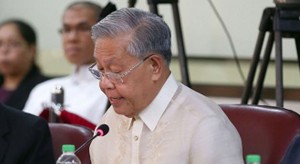Davide dares Congress: Be peacemakers, peacekeepers
MANILA, Philippines–“Be peacemakers, peace builders, and peacekeepers,” former Chief Justice Hilario Davide Jr. on Thursday challenged lawmakers, as he pushed for the approval of the proposed Bangsamoro Basic Law (BBL) that, he said, was born out of “exhaustion with war.”
Davide led the public presentation of the Peace Council Report on the BBL, days after the group turned it over to President Aquino and Congress on separate occasions.
Aquino initiated the Peace Council in an affort to save the proposed law after several senators and congressional representatives had threatened to block its passage.
The 165-page report detailed the council’s findings and recommendations to refine the proposed law, and clarified some provisions that have raised distrust of the Moro Islamic Liberation Front (MILF) among lawmakers following the Mamasapano debacle.
Forty-four members of the Philippine National Police’s Special Action Force (SAF) died in a clash with Moro rebels in Mamasapano, Maguindanao province, in January this year, while the SAF was pursuing terrorists that some lawmakers said were being coddled by the MILF.
Article continues after this advertisement‘Overwhelmingly acceptable’
Article continues after this advertisement“The Peace Council concludes that overall, the BBL is overwhelmingly acceptable and deserves the support of all Filipinos,” the report said, adding that the Bangsamoro region to be created under the BBL “shall remain part of the Philippines.”
The council report said that the BBL “complies with the Constitution’s mandate for the creation of autonomous regions, within the framework of the Constitution and the national sovereignty, as well as (the) territorial integrity of the Republic of the Philippines.”
But the council acknowledged certain infirmities in the proposed law, and suggested the deletion of the provision that would allow an increase in the number of Bangsamoro territories through a periodic vote by residents in areas not yet under the autonomous region.
The creation of an autonomous region, “including the definition of its territory, is the sole function of Congress,” the council said.
“Such changes of territory that establish the limits of the region require specific acts of Congress,” the council added.
If there were other “infirmities” in the bill, Davide said lawmakers should find a way “to correct” these deficiencies.
“It can easily be done,” the former Chief Justice said, adding that the Peace Council’s work should be viewed as a way to help “legislators be more thorough” when it comes to reviewing the BBL.
Unlike any other bill
In his presentation, Davide said the BBL was unlike any other piece of legislation “and should be viewed in its proper form.” The role of Congress in passing the bill was in fact a “continuation of the finalization and implementation of the peace agreement,” he added.
“[The BBL] is a product of a peace agreement… born out of the country’s exhaustion with war,” Davide said.
International observers
He noted that the 17-year peace negotiation process had the participation of international facilitators and observers, and that crafting the BBL even “necessitated the creation of the composite Bangsamoro Transition Commission (BTC),” a group represented by both government and the MILF.
“The legislative process must be seen as an indispensable and final step to complete and implement the agreement… Legislators are not only policy coordinators. They become peace builders, and I will add two more, peacekeepers and peacemakers,” Davide said.
The council also defended the BBL from the allegations of some lawmakers who accused their Bangsamoro counterparts of usurping the functions of such constitutional bodies as the Commission on Audit, Commission on Human Rights, the Civil Service Commission and the Commission on Elections.
“The wording of the BBL is clear. The Bangsamoro special bodies were created with the goal of supplementing, not supplanting, the work of their national counterparts,” the council report said.
Davide led the council’s cluster on constitutionality, and forms and powers of government.
RELATED STORIES
Peace council: No ‘silver bullet’ to end war in South
